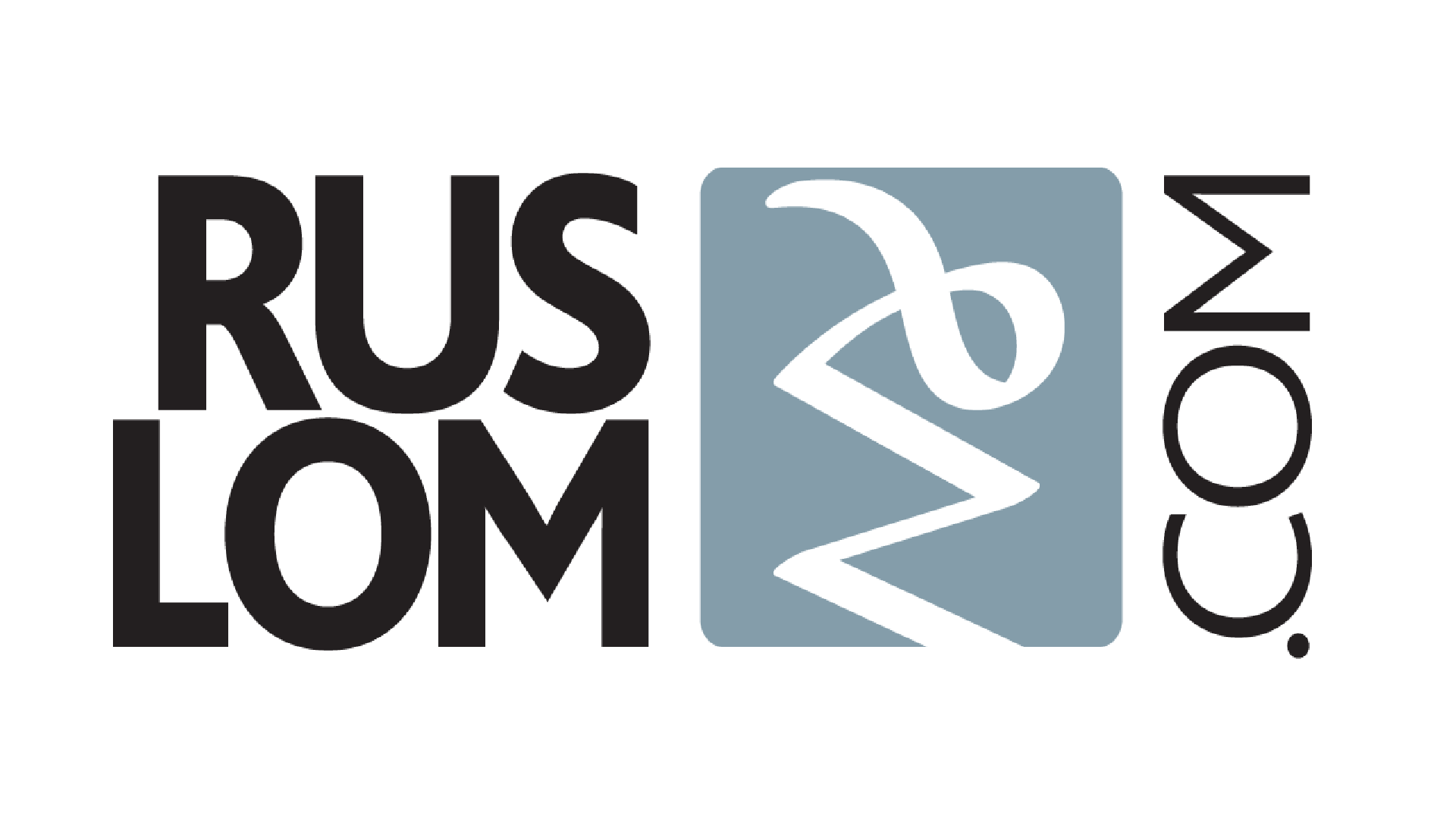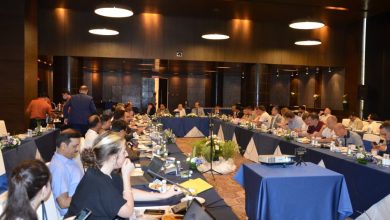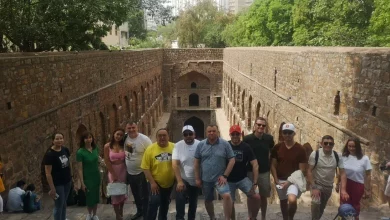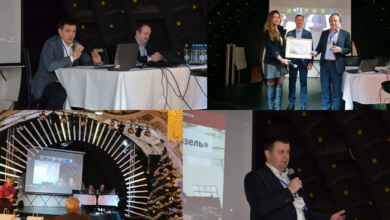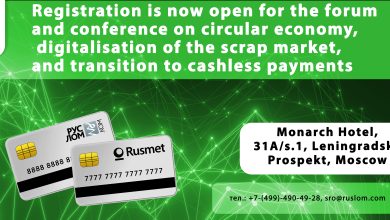Index
RUSLOM.COM NEWS: ANNOUNCEMENTS AND POST-RELEASES. 3
Regular General Meeting of RUSLOM.COM’s members is held in Moscow.. 3
Session on balance of metals and raw materials to be held at INNOPROM.. 5
RUSSIAN SCRAP PROCESSING INDUSTRY NEWS. 7
RUSMET RATING AGENCY INDICES. 9
METALLURGY NEWS OF RUSSIA.. 10
Kuzbass State Technical University develops airships to transport coal 10
Bystrinsky Mining and Processing Plant to increase production capacity. 11
Air separation unit at MMK.. 11
Russia at the forefront of global race for strategic metals. 12
Design of Rusal’s plant in Leningrad Region to start in late 2024–early 2025. 12
Metalloinvest to supply OMK with around 53 million tonnes of pellets. 13
MACROECONOMIC NEWS OF RUSSIA.. 15
New foreign currency exchange rates are set for the first time. 15
State Duma proposes to prohibit registration of vehicles without full payment of utilisation fee. 15
State Duma adopts progressive personal income tax. 16
RUSLOM.COM NEWS: ANNOUNCEMENTS AND POST-RELEASES
Regular General Meeting of RUSLOM.COM’s members is held in Moscow
On 27 June 2024 in Moscow at the Soluxe Hotel Moscow a regular General Meeting of members of the National Recycling Association RUSLOM.COM on the issues of the statutory activities of the organisation was held. The meeting was attended by 126 members of the Association, so the quorum for decision-making on the agenda was reached.
The President of the Association Vladimir Volodkin was elected as the Chairman of the Meeting, Director of the Association Victor Kovshevny was elected as the Secretary of the Meeting.
As a result of voting the Meeting approved the new composition of the Association’s Presidium for a period of 5 years. The Presidium consisted of:
Representatives of the Association member companies:
- Mrat Abdualinov, Director of LLC PK Metallinvest;
- Sergey Astakhov, General Director of OOO Translom;
- Igor Balashev, Executive Director of LLC Intermettrade;
- Alexandr Kobenko, member of the Board of Directors, Akron Holding Group;
- Evgeniy Konyakhin, founder of Yug-Met Production Technopark, YugTekhnoMet LLC;
- Sergey Kurnosov, General Director of Uni-Block LLC;
- Denis Kraev, General Director of JSC SGMK;
- German Lalayan, founder of CJSC “AGROPRIBOR”;
- Yuriy Nevrov, General Director of “NLMK-EcoTech”;
- Dmitriy Stechkevich, Director (founder) of JSC “PSKOVVVTORMET”;
and independent members of the Presidium of the Association:
- Alexey Alipchenko;
- Sergey Voytsekhovskiy, Chairman of Voytsekhovskiy Partners Co;
- Vladimir Volodkin;
- Vladimir Dvoretskiy, Chairman of “Republican Union of Industrialists of Secondary Metallurgy” Ltd;
- Kimball, Commercial Director in the Hungarian branch of Loacker Recycling Group;
- Andrey Polinov, Director of MMK VTORMET;
- Nikita Taganovich, Head of the Recycling Department of the Aluminium Association;
The elected members of the Presidium noted in their speeches that they are ready to actively promote the interests of the industry and respond to the existing challenges.
RUSLOM.COM thus enters the next “five-year” of its history, relying on a strong human capital.
The meeting also approved the list of members of the Association’s Audit Commission, which included:
- Vladimir Starikov, Head of Legal Department of NLMK Eco Tech Ltd;
- Valeriya Tyurina, attorney-at-law of Voytsekhovskiy PARTNERS;
- Yuliya Shish, Director of LLC “Avangard”.
Vladimir Volodkin was approved for a new term as the President of the Association from the elected members of the Presidium of the Association.
It was proposed to hold the introductory meeting of the Presidium in the new composition on the site of Innoprom exhibition in Ekaterinburg in July 2024.
A proposal was made to create a new Supervisory Board to facilitate the implementation of the Association’s strategy, receive monitoring and initiatives from regional companies, and prepare proposals for consideration by the General Meeting and the Presidium.
Session on balance of metals and raw materials to be held at INNOPROM
On 11 July 2024 at 10.30 at the INNOPROM exhibition in Ekaterinburg a session on the balance of metals and raw materials will be held with the participation of the Ministry of Industry and Trade of the Russian Federation, the National Recycling Association RUSLOM.COM, banks, scrap collectors, Russian and Chinese steelworks, metal trading and service companies.
Questions for discussion:
- Trends in state regulation of the domestic market and foreign trade operations;
- Market analysis, price indices for carbon and stainless steel, copper, aluminium, lead, products and scrap;
- Ways to improve the efficiency of banking services for the business with scrap, metals on the domestic and foreign markets;
- Logistics;
- Proposals of the international industrial community and resolutions, etc.
The business programme will be supplemented by a schedule of meetings with Chinese partners and experts, banks and analysts at the stand of Rusmet Rating Agency, as well as visits to companies and places of interest.
On 14 June, Xi’an hosts a communication session on Russian-Chinese business in the metal trade sector
Representatives of the companies discussed challenges and development opportunities in export and import, as well as in the production of stainless steel, aluminium, copper, carbon steel, and recycled materials for metallurgy.
Chinese colleagues stated that they are introducing more and more new production capacities in the metals sector. In particular, for stainless steel they are now smelting more than 40 million tonnes per year and will be introducing 23 million tonnes of capacity in the near future. They are therefore targeted at export markets
The following barriers to foreign trade activity and co-operation have been identified:
- Risks in the sphere of financial transactions. Including delayed transfers by the banks of the countries, difficulty in opening settlement accounts, expensive servicing of inter-country bank payments, instability of exchange rates.
- High interest rate on loans in Russia
- Long and expensive cargo logistics
- Barrier duty on export of stainless-steel scrap from Russia
Speaking at the conference in Xi’an about the Russian stainless-steel scrap market under the barrier export duty (290 euros per tonne), Victor Kovshevny, Director of RUSLOM.COM, drew attention to the price trend (comparison of LME and Rusmet price index for stainless-steel scrap), as well as the critical drop in scrap collection in Russia for this position.
The chart shows that the liquidity of scrap stock has actually gone to zero, as consumption of stainless-steel scrap by Russian mills does not exceed 20 thousand tonnes per year, while scrap collection is above 500 thousand tonnes per year.
Besides, importers buy scrap with nickel content of 7-8%, while Russian plants take only 10%. The scrap not demanded in the Russian Federation accumulates as harm to environment.
The speaker drew attention to the fact that in order to bring the stainless-steel scrap market out of the crisis it is necessary to revise the regulation of exports, as the increase in stainless steel production in Russia even by 300-500 thousand tonnes (now 160 thousand tonnes) and some growth in domestic consumption of scrap, will not give sufficient impetus.
Russian delegation of scrap and metal markets’ representatives visits Mysteel Corporation in Shanghai
Ways of development of Chinese-Russian cooperation in the sphere of carbon and stainless steel, aluminium, copper, including raw materials and rolled products are discussed.
The delegation included representatives of RUSLOM.COM, Cyberstal, RNA and RNA-Service, Profkomplekt, Salut Steel, Ferrum Trade, Yug-Met, Metinvest, Vtormet, Metallinvest Omsk, Metmarket, HuaHun-Rus, Intermettrade.
The organisers are Rusmet RA and Mysteel. Both analytical organisations presented data on prices, supply and demand, trends of state regulation in the sphere of foreign economic activity of the countries.

RUSSIAN SCRAP PROCESSING INDUSTRY NEWS
Armat Steelworks in Buryatia successfully launches production of construction rebar using ferrous scrap metal
The company received a subsidy to reimburse part of the cost of purchasing new equipment, as well as a targeted concessionary loan at 3% per annum from the Industrial Development Fund of the Republic of Buryatia. To launch the new production, the plant purchased equipment for melting metal and producing reinforcing bars.
According to the representative of the Ministry of Industry and Trade of Buryatia, there is currently no similar production in the republic. The equipment has already been installed and commissioned, and production has begun.
The plant currently employs more than 50 people and has a planned production capacity of 700 tonnes of rebar per month.
RUSLOM.COM: Consumption of ferrous scrap in Russia is estimated at about 20 million tonnes per year
Clothes, roads, houses and garden tools – all this has been produced in Russia for many years using secondary raw materials. According to the Russian Environmental Operator (REO), the production of products from recycled materials in Russia is most developed in metallurgy. Companies traditionally use ferrous scrap. The method of electric steel production is based on its use, says Denis Butsaev, CEO of REO. “Scrap is used not only what is extracted from municipal solid waste (MSW). To a greater extent, it is taken from various metal structures, machines and equipment,” he explained. According to the National Recycling Association RUSLOM.COM, consumption of ferrous scrap in Russia is estimated at around 20 million tonnes per year.
At the same time, in 2021 internal consumption of scrap by plants exceeded 25 million tonnes, in 2022 plants have already consumed about 22.5 million tonnes, and in 2024 there is a tendency to reduce the demand for scrap at steel plants in the country, the priority is more often given to primary raw materials.
The business of recycling secondary metals, plastic, waste paper, glass, rubber needs incentives.
Novosibirsk Region, Russian Environmental Operator and Akron Holding to create system for electronics waste management
It is planned to jointly implement an investment project to create a WEEE recycling centre in the Novosibirsk Region and to develop a network of WEEE collection points in various formats.

RUSMET RATING AGENCY INDICES

The Weekly Rusmet Index for Steel Scrap 3A FCA Russia domestic on 27th week 2024 (01 – 07 Jul) settled at 24 800 RUB/mt (ex VAT). The Index decreased by 100 RUB/mt (-0,4%) compared to previous week.
For 27th week 2024 (01 – 07 Jun) Rusmet Billet Index FOB Black Sea settled at 43 071 RUB/mt (up 0,8%), Rusmet HRC FOB Black Sea Index settled at 47 465 RUB/mt (down 0,4%), Rusmet CRC FOB Black Sea Index settled at 58 453 RUB/mt (down 0,0%), Rusmet Rebar FOB Black Sea Index settled at 44 284 RUB/mt (up 1,6%).
Rusmet Coal FOB Australia (62% CSR) Index compared to previous week increased by $12 (5,5%) to 219$/mt, Index for Coal FOB Australia (70% CSR) increased by $16 compared to previous week and is equal to 254$/mt.

METALLURGY NEWS OF RUSSIA
Kuzbass State Technical University develops airships to transport coal
At the Siberian Transport Forum in Novosibirsk, Kirill Kostikov, Vice-Rector of the Kuzbass State Technical University (KuzSTU), presented an innovative project to use airships to transport coal from deposits and processing plants. The idea is an alternative to rail transport, which often lacks the capacity to transport Kuzbass coal.
According to Kostikov, the airships, which are designed to carry 60 tonnes, consume 200 kg of fuel per hour, and a flight takes about 2.7 days. The cost of transporting coal by airship along the proposed route is 10.7 thousand roubles per tonne, which is slightly higher than the cost of transporting it by rail (9 thousand roubles per tonne). However, preliminary calculations show that as the technology develops, the cost of airship transport may become comparable to that of rail transport and even decrease in the long term.
The project is planned to be implemented as part of the Integrated Scientific and Technical Programme “Clean Coal – Green Kuzbass” launched in 2020.
Bystrinsky Mining and Processing Plant to increase production capacity
Nornickel’s Bystrinsky Mining and Processing Plant plans to double its ore processing capacity to 20 million tonnes per year by 2030.
Members of Nornickel’s Board of Directors recently visited Bystrinsky in the Zabaikalsky Krai and presented plans to increase production capacity. The company currently processes up to 11 million tonnes of ore per year, producing up to 68,000 tonnes of copper, 245,000 ounces of gold and 1.7 million tonnes of iron in concentrate.
To achieve its goal of doubling ore processing, the company is building a high-pressure grinding roll (HPGR) shop. This 5 billion roubles technology will increase capacity by 350,000 tonnes of ore per year by crushing it into smaller fractions, which will facilitate the enrichment process.
The next step will be the construction of the second stage of the plant, which will increase processing by a further 1 million tonnes. In parallel, it is planned to increase iron recovery by 10-15%. The construction of a gold extraction plant and a third production line with a capacity of 5 million tonnes of ore per year is also planned for the future.
In addition to the Bystrinskoye deposit, several major copper mining investment projects are underway in the Russian Far East. These include the development of the Udokan deposit in Transbaikalia, the Malmyzhskoye field in the Khabarovsk Krai and the Baimskoye field in Chukotka. All of these projects are targeted for export to China.
Air separation unit at MMK
A new air separation plant is being built in the Chelyabinsk region, which will be an important link in the development of the plant’s oxygen workshop. The new plant, known as AKAr 60/60, will not only meet modern requirements for cryogenic technology, but also promises to significantly increase the production of technical oxygen, pure industrial nitrogen and argon.
According to plans, the new complex will be able to produce up to 60,000 cubic metres of technical oxygen and 60,000 cubic metres of pure industrial nitrogen per hour, as well as up to 2,35,000 cubic metres of argon per hour. This will represent approximately one fifth of the plant’s current oxygen production and half of the plant’s nitrogen production.
According to MMK’s Information and Public Relations Department, the use of air separation products plays a key role in intensifying metallurgical production processes and improving product quality. There are currently 11 air separation units at the plant, serving various needs of the blast furnace and steelmaking shops.
The new complex will function as an independent oxygen plant under the sixth serial number, providing the necessary gases for the production processes. It includes cryogenic and compressor equipment, as well as storage and gasification systems for liquid air separation products. The cooling tower, pumping station and substation will ensure reliable operation of the plant and create more than 70 new jobs.
The general designer of the complex is Magnitogorsk Gipromez and the general contractor for the construction is Prokatmontazh JSC. At present, the installation of all equipment is almost complete, the machine hall building is finally finished, and the installation of air and nitrogen compressors and the air separation unit is underway.
Russia at the forefront of global race for strategic metals
According to international and Russian experts, consumption of metals such as copper, graphite, cobalt, and lithium is expected to grow significantly by 2030. As the world leader in production and reserves of many minerals, Russia plays a key role in ensuring this growth. For example, Russia controls 27 percent of the world’s platinoid production, 22 percent of nickel reserves, 13 percent of cobalt, 15 percent of titanium, 12 percent of tungsten, 9 percent of copper, and also has significant reserves of rare-earth metals and graphite.
Speaking at the SPIEF-2024 expert session, the Russian Minister of Natural Resources and Environment, Alexander Kozlov, emphasised that Russia is seeking to create long mineral processing chains that include the production of end products.
One of the key areas was uranium processing, from mining to fuel.
Evgeny Petrov, head of the Federal Agency for Subsoil Use, reported on systematic work to assess deposits of scarce minerals. According to him, a list of 46 deposits has already been drawn up, for which preferences and incentives have been developed to attract private companies.
Federal investments in the geological exploration of solid minerals have been redirected to the search and exploration of scarce resources in Siberia and the Far East.
Design of Rusal’s plant in Leningrad Region to start in late 2024–early 2025
The cost of the project may increase by 10-15% by this date, experts believe.
Design work on Rusal’s alumina refinery in the Lomonosov District of the Leningrad Region will begin in late 2024 – early 2025, Dmitry Yalov, Deputy Chairman of the Regional Government, told Vedomosti Severo-Zapad.
According to him, survey work is currently underway, in particular the process of land surveying for the port terminal and road infrastructure. “After that, design work will begin, environmental impact assessments will be carried out, and the results will be presented to the public. Only then will final decisions be made,” Yalov said.
He stressed that the construction of the alumina refinery is a matter of ensuring the security and independence of the Russian aluminium industry. “An absolutely correct decision was made to locate the bauxite ore processing and alumina production plant near the port terminals,” Yalov added.
At SPIEF-2023, the Governor of the Leningrad Region Alexander Drozdenko and Evgeny Nikitin, CEO of JSC Russian Aluminium Management, signed an agreement for the construction of an alumina refinery and deep-water port in Ust-Luga. The investment in the project will amount to RUB 400 billion. According to the signed agreement, the first stage of the project, with a capacity of 2.4 million tonnes, will be completed in 2028, and the second stage, with a similar capacity, in 2032. The project includes the construction of four technological lines for alumina production, a deep-water port with related infrastructure, sludge storage, energy infrastructure, and auxiliary facilities. The company plans to import raw materials for the alumina refinery in the Leningrad region from its own plant in Guinea.
At the same time, Yalov specified that the plant “will definitely be built”. Freedom Finance Global analyst Vladimir Chernov notes that all the key aspects of the project have already been decided. According to him, the technology and equipment will be the same as that of the modern alumina refinery in China of the metallurgical company Hebei Wenfeng New Materials (HWNM). Rusal acquired a 30% stake in the Chinese company in October last year. At the time, the press service of the Russian aluminium producer reported that this would help to strengthen Russia’s raw material security.
At the same time, the required investment volume may increase by 10-15% by the time the project is launched, Chernov believes. “Inflation in Russia reached 8.17% on an annual basis in May 2024. Technology and equipment for the construction of the alumina refinery in the Leningrad region will come from China, and logistics from China have also increased in price over the year. Therefore, a 10-15% increase in the estimated cost of building this plant is quite likely,” the expert said.
Anna Garkusha, an expert with the “Separate Collection” environmental movement, does not rule out the possibility that the terms of the project’s implementation and the final conclusion of the state environmental impact assessment may be delayed due to the public attention. She cited the example of the construction of waste processing plants in the Leningrad region. For example, local residents tried to use the courts to challenge the conclusion of the state environmental impact assessment of the “Dubrovka Waste Processing Complex” project documentation. The court dismissed the case, but such moments delay the implementation of projects, the expert notes.
“The speed of the project implementation will depend on the activity of the local population. Investors and authorities, in turn, must prove the safety of the plant”, stressed Garkusha.
Earlier, the authorities of the Leningrad region had repeatedly announced that they had placed the implementation of the project to build an alumina refinery, including all stages of expert opinions and public hearings, under “special control”. As Yalov noted, the environmental issue is “one that the regional government is concerned about”. “Russian legislation imposes the strictest requirements on investors, including the use of modern technologies,” he said.
Metalloinvest to supply OMK with around 53 million tonnes of pellets
Metalloinvest and OMK have signed an agreement under which Metalloinvest will fully cover OMK’s pellet needs for 15 years. The memorandum of the long-term agreement was signed by Nazim Efendiev, Chairman of the Board of Directors of Metalloinvest, and Anatoly Sedykh, Chairman of the Board of Directors of OMK, on the sidelines of the St. Petersburg International Economic Forum.
The agreement is for 15 years, during which Metalloinvest will fully meet OMK’s needs for high quality raw materials – DR grade iron ore pellets with high iron content and reduced silicon content, Metalloinvest said in a statement. The total volume of supplies will be about 53 million tonnes of pellets.
The signing ceremony was attended by First Deputy Prime Minister Denis Manturov and State Secretary – Deputy Minister of Industry and Trade Viktor Evtukhov.
‘This is a record-breaking contract in terms of timing and volume of deliveries, a landmark for Russia’s mining and metallurgical industry,’ said Efendiev. ‘It will be an important milestone in the ecological transformation of domestic metallurgy.’ Metalloinvest will bring to the partnership with OMK its unique long-term experience in the use of low carbon footprint technology for the production of direct reduced iron.
Future of palladium
Research of new applications for palladium could increase global demand for the metal by around 14% over the next five years. Dmitry Izotov, director of Nornickel’s Palladium Centre speaks about significant plans of the metallurgical group.
According to him, Nornickel plans to develop about 120 new materials for high-tech industries by 2030, which will increase global demand for palladium by 40 tonnes a year. The company is conducting basic research in collaboration with research institutes to explore and discover new applications and properties of palladium in various fields. The main objective of this research is to develop and commercialise new products for green technologies.
The company’s activities in this area are driven by its desire to achieve the highest possible carbon neutrality of its metals. This requires replacing at least 84% of energy sources used today (mainly hydrocarbons) with renewable sources such as hydrogen, solar and biofuels. However, at the current stage of technological development, their share is unlikely to exceed 25%.
The main challenge is the slow pace of new technologies in the industrial sector due to higher costs and technical limitations. In this context, Nornickel’s Palladium Centre is developing more efficient palladium-based materials and alloys to reduce costs and accelerate the widespread adoption of green technologies.
One example of such solutions is a catalyst developed by Nornickel for a hydrogen electrolyser. Palladium replaced 30% of the iridium in this catalyst, reducing the cost of the device (palladium costs much less than iridium) and increasing its performance five times while maintaining its lifetime.
Nornickel has also developed catalysts for fuel cells in which palladium replaces platinum. Despite the similar cost of these metals, devices using palladium are three times more efficient.
Global demand for palladium is now estimated at around 290 tonnes per year. The introduction of Nornickel’s new products could increase this figure by 13.8%.

MACROECONOMIC NEWS OF RUSSIA
New foreign currency exchange rates are set for the first time
The Bank of Russia has set official exchange rates for the first time since the sanctions were imposed on Moscow Exchange, against the background of which the platform stopped trading in dollars and euros. Information about them is published on the regulator’s website.
According to the new rules for determining the indicator, the exchange rate is determined on the basis of data from credit organisations’ reports on the results of interbank conversion operations concluded on the over-the-counter foreign exchange market.
State Duma proposes to prohibit registration of vehicles without full payment of utilisation fee
The bill expands the list of grounds for refusal of registration. If the bill is adopted, the grounds for refusing registration, including in connection with a change of ownership, will be “the application to the registration authority of the owner of a motor vehicle who has not paid the use fee” within the prescribed period.
This applies to a vehicle imported into the Russian Federation from abroad by an individual. From 1 August 2023, the recycling fee for new and used cars, LCVs, trucks and buses imported into Russia for resale was indexed. This measure affected both legal entities and individuals planning to resell vehicles imported after 1 August within one year. At the same time, the indexation of the duty did not affect individuals importing cars with an engine capacity of up to 3 litres for personal use. They will continue to pay the duty at a preferential rate – 3,4 thousand roubles for cars up to three years old and 5,2 thousand roubles for cars over three years old.
Amendments are proposed to the Law “On State Registration of Vehicles in the Russian Federation”. In the first reading of the bill was adopted by the State Duma in November 2023. Its author was the head of the Duma Committee on Transport and Development of Transport Infrastructure Yevgeny Moskvichev.
Government softens requirements for compulsory repatriation of foreign currency proceeds by largest Russian exporters
From 29 June, they are obliged to deposit into their accounts at least 60% of currency under foreign trade contracts, rather than 80% as before. The requirement applies to a number of exporters operating in the fuel and energy complex, ferrous and non-ferrous metallurgy, chemical and timber industries, and grain farming.
State Duma adopts progressive personal income tax
The State Duma has adopted in the first reading amendments to the Russian Tax Code introducing a progressive personal income tax scale.
The amendments introduce a progressive personal income taxation scale with rates starting from 13% (for annual income up to 2.4 million roubles) with a gradual increase to 22% depending on the level of income.
The tax rate for the self-employed will remain unchanged.
According to the financial and economic justification to the draft law, this will allow for an additional allocation of about 1.4 trillion roubles to the Russian budget system, of which 533 billion roubles – in 2025.
CONTACT: Alexey Kondratyev Director, Public Relations National Recycling Association RUSLOM.COM Address: 119017 Bolshaya Ordynka st., 50 b.1, Moscow, Russian Federation Phone/fax:+7 (499) 490-49-28 Mobile: +7 (903) 363-53-93 E-mail:a.kondratiev@ruslom.com
